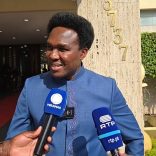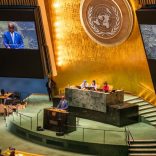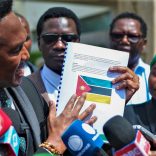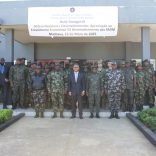Mozambique: Mondlane supports IL's vote against Portuguese president's visit
CTA: Mozambican business forum calls for President Nyusi’s direct leadership in peace talks

Lusa (File photo) / President Filipe Nyusi
The CTA (Confederation of Economic Associations) on Friday (December 30) called on President Filipe Nyusi to assume direct leadership in ongoing peace negotiations, arguing that Mozambicans could solve their own problems without external intervention.
In a statement sent to Lusa on Friday, the CTA maintains that after the temporary truce declared by Mozambican National Resistance (Renamo) leader Afonso Dhlakama following a telephone conversation with Nyusi, the head of State “should take direct leadership of the dialogue, because it has proven to be an effective approach”.
Alluding to the participation of international mediation in talks between the government and Renamo, which has yet to produce results, the business confederation says the one-week truce agreed by the two leaders “is an unequivocal sign that peace is possible in Mozambique” and that Mozambicans are able to solve their problems “without external intervention”.
“Obviously, the operation of each understanding reached in this dialogue may be the responsibility of the Joint Commission, which is made up of only Mozambican players,” the statement said.
The CTA encourages the Mozambican president to continue his efforts and hopes that “the Renamo leader will realize, as he realized this time, that Mozambicans need this inalienable precious asset: peace!”
Peace, CTA notes, “contributes to a better business environment” and creates “conditions for companies to produce, increase jobs and contribute to poverty reduction in Mozambique”.
On Tuesday (December 27), the Renamo leader announced a one-week truce as a “goodwill gesture” following a telephone conversation with the Mozambican president the day before.
Filipe Nyusi said on Wednesday that the truce would encourage dialogue aimed at lasting peace.
The second day of the cessation of hostilities was however marred by the killing, considered politically motivated by the opposition party, of a Renamo leader in Nampula.
Mozambique is undergoing a political and military crisis marked by clashes in the centre and north of the country between the armed wing of the main opposition party and state defence and security forces, as well as mutual accusations of abductions and assassinations of political leaders.
Renamo accuses the Mozambican Liberation Front (Frelimo) of having vitiated the 2014 elections and demands to govern in six provinces where it claims victory in the polls.
The work of the joint commission of government and Renamo delegations halted in mid-December without an agreement on the decentralisation package, one of the key issues in the peace negotiations, and the mediators left Maputo, saying they would only return if asked by the parties.
The Mozambican president has proposed that a specialized working group, “without political distinction” or the presence of the current group of mediators be set up to discuss the decentralisation package, but Dhlakama has already said that he will not give up international mediation.
In addition to the decentralization package and the cessation of clashes, the agenda of the negotiation process integrates the depoliticisation of the defence and security forces, the disarmament of the armed wing of the opposition and its reintegration into civilian life.












Leave a Reply
Be the First to Comment!
You must be logged in to post a comment.
You must be logged in to post a comment.